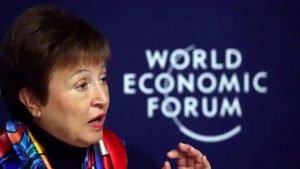![]()
Amid a flood of government spending, the global downturn sparked by the coronavirus pandemic will not be as bad as originally feared, IMF chief Kristalina Georgieva said Tuesday, but she warned that the crisis is far from over.
“The picture today is less dire … allowing for a small upward revision to our global forecast for 2020,” she said in a speech ahead of IMF-World Bank autumn meetings next week, when the IMF is due to present its updated forecasts.
In June, the Washington-based crisis lender projected a nearly five percent contraction of global GDP, but results in the second and third quarters were better than expected.
Georgieva credited the “extraordinary policy measures that put a floor under the world economy” which amounted to $12 trillion in fiscal support to households and firms.
But she warned governments not to prematurely withdraw the help they have provided, since the outlook for next year is mixed and rife with uncertainties and risks.
After more than a million deaths, “this calamity is far from over. All countries are now facing what I would call ‘The Long Ascent’ — a difficult climb that will be long, uneven, and uncertain,” Georgieva said.
In the United States and Europe the downturn, though painful, was not as bad as economists feared at the outset, and China is seeing “a faster-than-expected recovery.”
But the news elsewhere is bad: “In low-income countries, the shocks are so profound that we face the risk of a ‘lost generation,’“ she said.
“There is also now the risk of severe economic scarring from job losses, bankruptcies, and the disruption of education.”
Low-income countries have not had the resources to spend as much to support jobs and businesses, and also will need help to deal with their debt burden, including through more grants and debt restructuring.
She likened the crisis to World War II when leaders “forged a better world in the worst possible moment,” and called for governments to continue support for workers as long as it is needed, while spending to create a better, more equitable, economic system.
“Where the pandemic persists, it is critical to maintain lifelines across the economy, to firms and workers,” she said. “Cut the lifelines too soon, and the Long Ascent becomes a precipitous fall.”
But, Georgieva said, “We cannot afford simply to rebuild the old economy, with its low growth, low productivity, high inequality, and worsening climate crisis,” and she called for more spending on green jobs which can generate more employment.
“This will require both stimuli for job creation, especially in green investment, and cushioning the impact on workers,” she said. “Safeguarding social spending will be critical for a just transition to new jobs.”She referred to an IMF report released Monday showing that increasing spending by just one percent of GDP could create 33 million new jobs.






